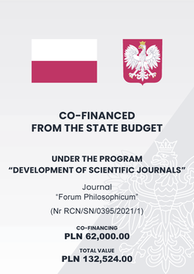Mowa i rzeczywistość w trzecim tysiącleciu: dziedzictwo Eugena Rosenstocka-Huessy, Michaiła Bachtina, Martina Bubera i Franza Rosenzweiga
Abstract
Perhaps the burning issue facing us today is how people from different cultural backgrounds can live together or in close proximity with one another and preserve their identities without destroying one another. This topic is important to me because I believe that new understandings about what we mean by the terms “speech” and “reality”' may contribute towards an improvement in our ability to work together with peoples of diverse backgrounds in order to create a more caring an humane planet. As I approach my three score and ten years of life and think about the importance for future generations of the legacies of my teacher Eugen Rosenstock-Huessy, of Mikhail Bakhtin, Martin Buber and Franz Rosenzweig, two Christians and two Jews, whose lives and writings have also influenced my own life and thinking. I would single out their insights into speech and language as worthy of serious attention by future generations. When asked by students and colleagues if there is a single unifying theme that we should focus our energies on, without hesitation, I say: speech and reality.
Cite this article
Stahmer, Harold M. "Mowa i rzeczywistość w trzecim tysiącleciu: dziedzictwo Eugena Rosenstocka-Huessy, Michaiła Bachtina, Martina Bubera i Franza Rosenzweiga." Forum Philosophicum 3 (1998): 137–56. doi:10.35765/forphil.1998.0103.8.




